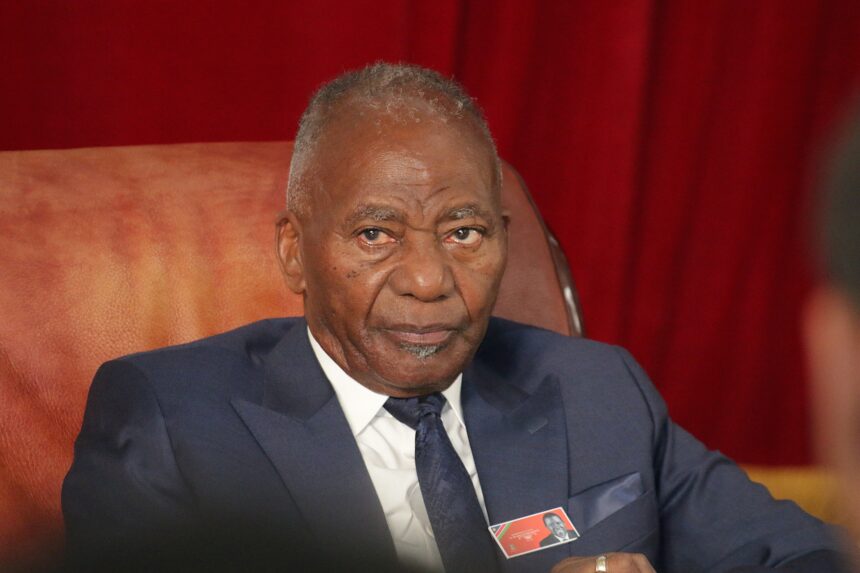Lahja Nashuuta
Former Speaker of the National Assembly Prof Peter Katjavivi has welcomed the decision by the Independent Patriots for Change (IPC) to revisit its earlier stance and assume the Office of the Leader of the Official Opposition.
He said the office plays a vital role in strengthening governance and accountability in Namibia.
IPC president Panduleni Itula had previously announced that his party would not take up the position, claiming the office lacked legal establishment and did not serve the interests of the people. Despite this stance, the IPC went ahead and announced its shadow cabinet, whose constitutional basis remains vague.
However, in a surprising reversal, Itula appointed IPC spokesperson Imms Nashinge as the leader of the official opposition in the National Assembly. Katjavivi hailed the move as a positive democratic step.
He highlighted that the Office of the Leader of the Official Opposition is designed to serve any party which qualifies for the role.
“It is not selective,” he stated.
“Parliament operates independently of internal party dynamics. Its structures are designed to uphold democratic processes and ensure accountability,” he added.
Responding to recent criticism from the IPC regarding the legality of the office of the official opposition, Katjavivi suggested the confusion may stem from the IPC’s own party constitution. “Their internal rules, such as the clause preventing their party president from becoming a Member of Parliament, are their own prerogative. But they should not be allowed to distort parliamentary procedures,” he emphasised. Katjavivi stated in an interview with New Era last week that effective opposition is essential to a well-functioning democracy.
However, this can only be achieved if opposition parties in Parliament are adequately resourced and empowered to carry out their responsibilities.
“During my tenure as Speaker, establishing this office was one of the key reforms we implemented as part of the broader ‘agenda for change’,” he noted.
The agenda for change initiative was initially introduced by founding Speaker, late Mosé Penaani Tjitendero.
It is a set of reforms to enhance efficiency within the Legislative Arm of the State. As part of this ongoing effort, the Namibian Parliament has benchmarked itself against legislatures within the Commonwealth and globally to ensure it becomes a modern, effective institution, in line with other members of the Inter-Parliamentary Union (IPU).
“We also prioritised the operationalisation of the Parliamentary Service Commission, and worked to reduce duplication between the National Assembly and the National Council in shared service areas such as information and communication technology, the library, legal services, research, public relations and the Parliamentary Budget Office – all of which enhance legislative oversight, fiscal responsibility and sustainable development,” Katjavivi continued.
Legality
Katjavivi pushed back against critics questioning the legality of this office.
He argued that the Constitution gives the President the authority to establish such offices. “Can it truly be unconstitutional for the President to proclaim an office that the Constitution itself implies should exist?” he asked. “Is a Gazetted proclamation not legally- binding?”, Katjavivi questioned.
He cited Article 32(7) of the Namibian Constitution, which authorises the President, in consultation with the Cabinet and upon the recommendation of the Public Service Commission, to establish offices within the public service not otherwise created by law, and to appoint individuals to those offices with terms and conditions set by the President.
“Some interpret this provision as relating only to the general public service, but they overlook the fact that Parliament is a distinct arm of the State,” Katjavivi said.
“It is not governed by the Public Service Commission, but the Political Office- Bearers Commission,” he added.
He said: “Parliament is governed by its own standing rules and orders for both the National Assembly and the National Council. As one of the three autonomous yet complementary arms of the State, the Legislature must be insulated from external political interference”.
McHenry Venaani, president of the Popular Democratic Movement (PDM) and former leader of the official opposition for a decade, weighed in. He recently questioned Itula’s stance against the legitimacy of the office.
Venaani pointed out that not all roles within Parliament are constitutionally mandated. “Take party whips, for example. These positions exist under parliamentary rules – not the Constitution. The same logic applies to the Office of the Official Opposition,” he said.
Venaani stated that the IPC’s objection may be rooted in internal party dynamics.
“Itula fears the emergence of two centres of power within the IPC,” he said.
“The party’s leader in the National Assembly, who would naturally fill the role of official opposition leader, might overshadow Itula, who, not being a Member of Parliament, is ineligible for the position,” he added.
-lnashuuta@nepc.com.na
Photo: Heather Erdmann



